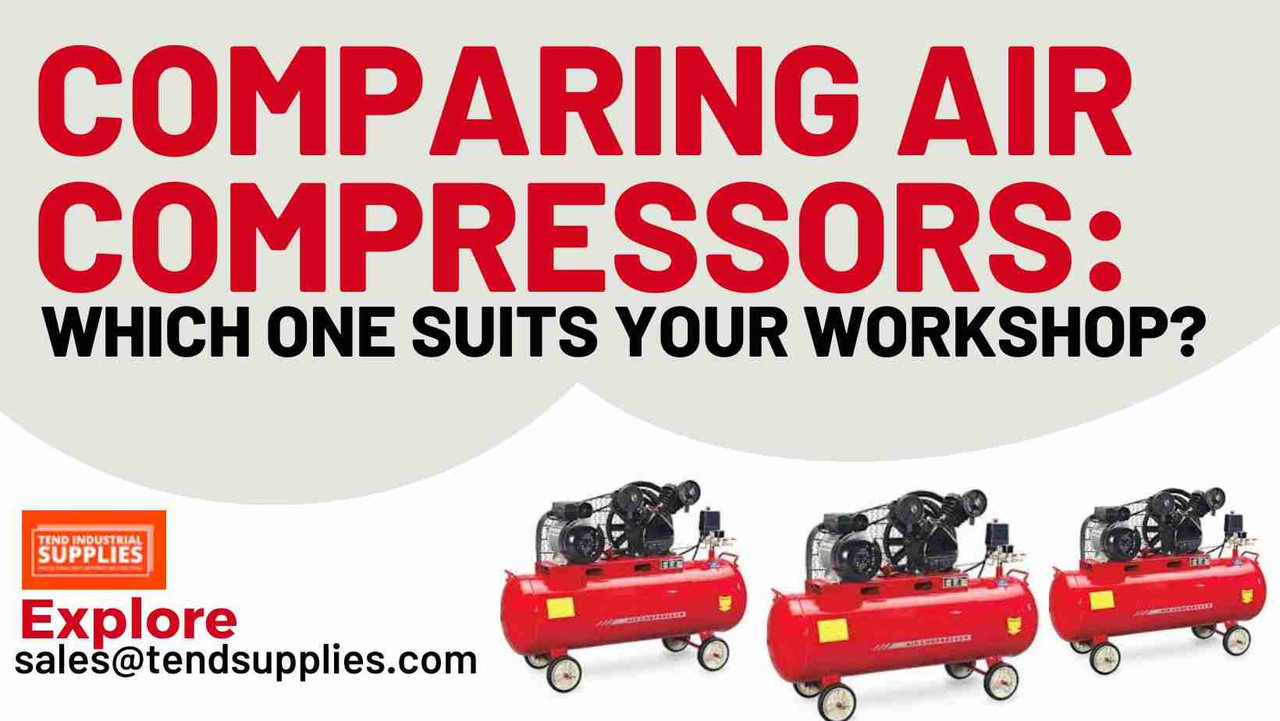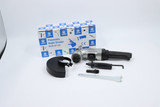Comparing Air Compressors: Which One Suits Your Workshop?
An air compressor is an essential tool for any workshop enthusiast. It breathes life into pneumatic equipment, powering everything from nail guns and impact wrenches to paint sprayers and tire inflators. But with a vast array of air compressors available, choosing the right one for your workshop can feel overwhelming. Fear not, fellow tinkerer! This comprehensive guide from Tendsupplies.com will equip you with the knowledge to navigate the world of air compressors and select the perfect fit for your workspace.
Key Takeaways of this article:
- Match your air compressor to your workshop needs. Consider the types of projects you tackle and your air tools' CFM/PSI requirements.
- Electric vs. Gas-powered: Electric models are quieter and require less maintenance, while gas-powered ones offer higher CFM outputs.
- Portability: Choose a portable model with wheels if you need to move the compressor around your workshop.
Understanding Your Needs:
The ideal air compressor for your workshop hinges on two crucial factors: air demand and application. Let's break down each element:
Air Demand:
Air demand refers to the amount of compressed air a tool requires to function effectively. This is measured in two key units:
- Cubic Feet per Minute (CFM): This indicates the volume of air a compressor can deliver in one minute. Higher CFM translates to greater air output and the ability to power more demanding tools.
- Pounds per Square Inch (PSI): This measures the pressure of the compressed air. Tools have specific PSI requirements - nail guns might need 70-100 PSI, while spray guns require higher pressure (around 90-120 PSI) for proper atomization.
Application:
The types of projects you tackle in your workshop will significantly impact your air compressor choice. Here's a breakdown of typical applications and their air requirements:
- DIY Projects & Home Maintenance: A smaller compressor (1.5-3.0 CFM, 90-120 PSI) might suffice for inflating tires, stapling furniture, or using low-pressure paint sprayers.
- Woodworking & Crafts: Operating brad nailers, small sanders, and dust collection systems typically require a mid-range compressor (3.0-5.0 CFM, 90-120 PSI).
- Automotive Repair & Metalworking: High-demand applications like impact wrenches, tire inflators with blow guns, and sandblasters necessitate a larger compressor (5.0+ CFM, 120+ PSI).
Key Considerations:
Beyond air demand and application, several other factors influence your choice:
- Power Source: Electric air compressors are quieter and require less maintenance, but their CFM output might be limited. Gas-powered compressors offer higher CFM but are louder and require ventilation.
- Tank Size: The air tank stores compressed air, allowing for continuous tool operation without constant compressor cycling. A larger tank (around 6-10 gallons for most workshops) ensures smoother workflow.
- Noise Level: Consider a quieter electric compressor or a model with noise-reduction features for noise-sensitive environments.
- Portability: A portable model with wheels is ideal if you need to move your air compressor around the workshop.
The Next Step: Exploring Your Options!
Now that you understand your air requirements and key considerations, it's time to delve into the exciting world of air compressor choices at Tendsupplies.com! In the next section, we'll explore various air compressor categories, analyze specific models, and equip you with the knowledge to make an informed decision.
Delving into Air Compressor Options at Tendsupplies.com:
Having identified your air needs and workshop requirements, let's explore the diverse air compressor selection at Tendsupplies.com! To simplify your search, we'll categorize them based on power source, size, and portability.
Electric Air Compressors:
Electric air compressors are popular for workshops due to their quiet operation, lower maintenance needs, and ease of use. Here's a breakdown of some key electric models at Tendsupplies.com:
- California Air Tools Quiet Series: This series offers exceptional noise reduction, making it ideal for workshops with noise limitations. Models like the CAT-1P1060S (1.0 HP, 1.2 CFM, 1 gallon tank) are perfect for inflating tires, stapling, and light DIY projects.
- PORTER-CABLE Pancake Air Compressors: These compact and portable compressors are well-suited for small workshops and home garages. The PORTER-CABLE C2002 (2.0 HP, 2.6 CFM, 6-gallon tank) provides ample power for brad nailing, painting, and operating dust collection systems.
- DEWALT Electric Air Compressors: DEWALT offers a range of electric compressors catering to various needs. The DWFP55175 (1.6 HP, 5.0 CFM, 2.6-gallon tank) is a versatile option for moderate-duty applications like operating impact wrenches and air sanders.
Gas-Powered Air Compressors:
Gas-powered air compressors deliver higher CFM outputs, making them ideal for powering demanding pneumatic tools. However, they are generally louder and require proper ventilation due to exhaust fumes. Here are some gas-powered options to consider at Tendsupplies.com:
- Hitachi Gas-Powered Wheelbarrow Air Compressors: These powerful and portable compressors are well-suited for construction sites or large workshops. Hitachi METABO HPT EC2510E 8-Gallon 5.5 HP Gas Powered Wheeled Air Compressor: This compressor has a Honda GX engine and a solid cast iron cylinder.
- Hitachi 8-Gallon Single Stage Gas Horizontal Air Compressor: This compressor has a 4.8-HP industrial OHV Honda engine and can be used with a variety of air tools and accessories.
- Hitachi 6.5-HP 8-Gallon Gas Wheelbarrow Air Compressor w/ Honda Engine EC25E: This compressor has been discontinued.
- Metabo HPT 5.5-HP 8-Gallon Gas Wheelbarrow Air Compressor w/ Honda Engine EC2610E: This compressor has a Honda engine and a Hitachi logo.
- Craftsman Professional Series Gas Air Compressors: Craftsman offers reliable gas compressors for professional and severe DIY use. The CMECAW210 (6.0 HP, 13.5 CFM, 21-gallon tank) provides ample power for automotive repair, metalworking, and high-pressure tasks.
- Craftsman 25 Gallon: This is a portable, 175 psi, 2-stage, oil-free pump with a heavy-duty crankcase, crankshaft, and cylinders. It has rugged wheels for easy handling and maneuverability and can operate on a 120v household circuit.
- Craftsman PROFESSIONAL 9-16474 is a portable 27-gallon compressor with a 1.9 HP motor, 5.8 SCFM @ 90 PSI air delivery, and an aluminum single-stage oil lube pump. It has ergonomic handles, pneumatic wheels, and dual voltage.
- CRAFTSMAN 80-Gallons Two Stage 175 Psi Vertical Air Compressor with Accessories #CMXECXM803: A vertical air compressor with a 2-stage design and 175 psi.
- CRAFTSMAN V20 2.5-Gallons Portable Cordless 125 PSI Pancake Air Compressor #CMCC2520M1 is a portable, cordless air compressor with a 2.5-gallon capacity and 125 psi.
- CRAFTSMAN 33-Gallons Portable 175 Psi Vertical Air Compressor #CMXECXM331: A portable, vertical air compressor with a 33-gallon capacity and 175 psi.
- CRAFTSMAN CMXECXM601: A 60-gallon, 175 PSI vertical air compressor with a twin-cylinder inline oil lube pump. It has a 3/4-in fitting size, weighs 152 lbs, and has a 2-year limited warranty.
Portable vs. Stationary Air Compressors:
Portability is another crucial factor to consider. A portable model with wheels is ideal if you need to move your air compressor around the workshop or job site. Tend Industrial Supplies offers a wide selection of both portable and stationary air compressors:
Portable Air Compressors:
Most electric and smaller gas-powered models mentioned earlier are considered portable due to their compact size and wheels. These are ideal for confined workspaces or when flexibility is needed.
Stationary Air Compressors:
Stationary air compressors are typically larger and more powerful, designed for workshops where space isn't a significant constraint. They offer larger tank capacities for extended use without frequent cycling.
Selecting a suitable air compressor empowers you to tackle various workshop projects efficiently and quickly. By understanding your air requirements and workshop limitations and exploring the diverse air compressor options at Tendsupplies.com, you'll be well-equipped to make an informed decision.
Stil, deciding which air compressor best suits your needs? Our expert staff at Tendsupplies.com is happy to help! Contact us today at sales@tendsupplies.com, and let our knowledgeable team help you find the perfect air compressor to elevate your workshop capabilities!
FAQs:
1. How much maintenance does an air compressor require?
Electric air compressors generally require minimal maintenance, mainly draining the tank and occasional oil changes (for oil-lubricated models). Gas-powered compressors require more frequent maintenance, including oil changes, spark plug replacements, and air filter cleaning.
2. Can I use an extension cord with my electric air compressor?
Yes, you can use an extension cord with your electric air compressor, but choosing the right one is crucial. Ensure the extension cord has a sufficient gauge (thickness) to handle the compressor's current draw. Using an undersized extension cord can lead to a voltage drop, reducing compressor performance and potentially causing overheating. Consult your owner's manual for recommended extension cord specifications.
3. What safety precautions should I take when using an air compressor?
Always wear safety glasses when operating an air compressor to protect your eyes from debris or accidental tool recoil. Wear hearing protection when using compressed air tools to avoid noise-induced hearing loss. Ensure a proper connection between the air hose and the tool to prevent accidental disconnects. Never point compressed air at yourself or others to avoid serious injuries. Finally, always follow the manufacturer's safety instructions for your specific air compressor model.
4. How do I drain the condensate (water) from the air tank?
Most air compressors have a drain valve at the bottom of the air tank. Locate the drain valve (consult your owner's manual if needed) and open it periodically to release accumulated moisture. Draining the condensate helps prevent rust and corrosion within the tank and extends the lifespan of your air compressor.
5. My air compressor seems to be losing pressure. What could be the cause?
Several factors can contribute to air pressure loss in an air compressor. Here are some common culprits:
- Leaking air hose: Inspect the air hose for any punctures or worn connections. Leaks will cause pressure loss and prevent the compressor from reaching its full potential.
- Faulty pressure relief valve: This valve is designed to release excess pressure if the compressor malfunctions. A malfunctioning valve might be constantly releasing pressure, hindering performance.
- Worn piston rings (gas-powered models): In gas-powered compressors, worn piston rings can lead to internal leakage, affecting pressure output.
- Low oil level (oil-lubricated models): Ensure your oil level is maintained according to the manufacturer's recommendations. Running an air compressor with insufficient oil can cause internal friction and pressure loss.
If you suspect a leak, faulty valve, or worn parts, consult a qualified technician for repairs or replacements.
Remember: By following these tips and utilizing the diverse air compressor selection at Tendsupplies.com, you can find the perfect tool to empower your workshop projects. Don't hesitate to contact our knowledgeable staff at sales@tendsupplies.com for expert advice and assistance in selecting the ideal air compressor for your needs!

- Selecting the Right Air Compressor: Powering Up Your Your Pneumatic Projects
- Portable Air Compressors for On-the-Go Projects: Mobility And Convenience Unleached.
- Ultimate Guide to Choosing the Best Air Compressor for Your Home Garage
- Understanding the Right Size of Air Compressor for Your For Your Pneumatic Air Tools in 2023..
- 2024's Leading Air Compressors: Comprehensive Reviews and Buyer's Guide









